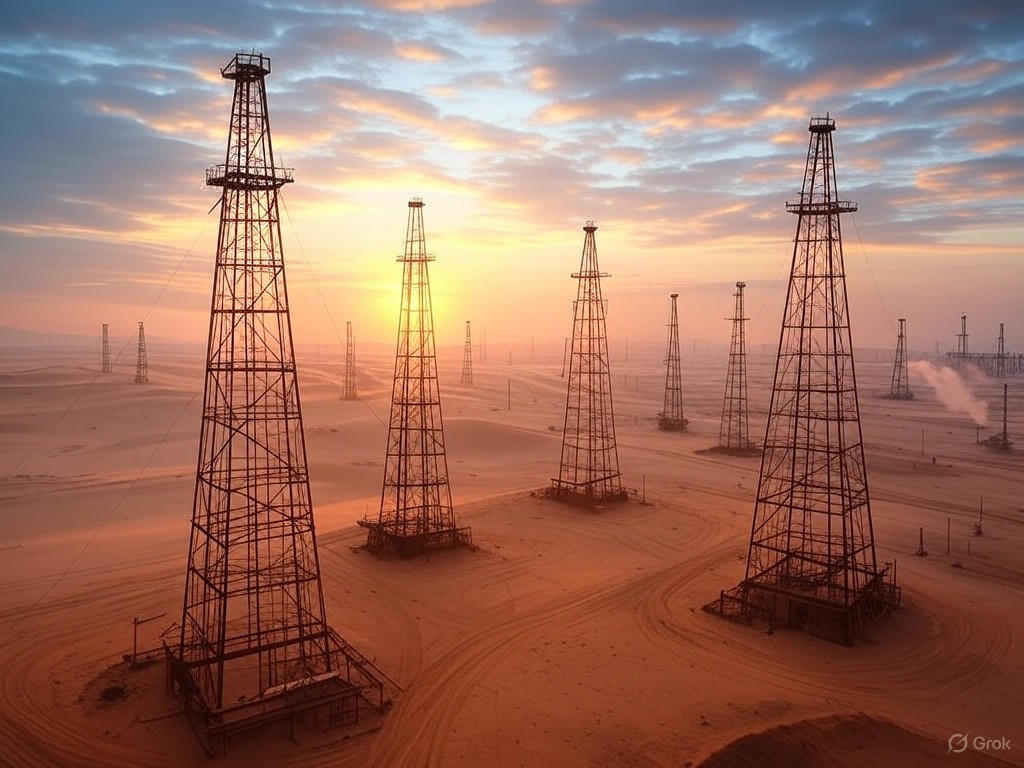Saudi Arabia’s Oil Strategy: OPEC’s Grip on Global Markets
As Marian Shelleigh, I draw inspiration from the reasoned critiques of Mary Shelley to examine the intricate dance of geopolitics and energy markets. In an era where the world's economic engine still hums on the fuel of hydrocarbons, the decisions of a single nation can ripple across continents, influencing everything from household budgets to international alliances. Today, we turn our gaze to Saudi Arabia's dominant role in OPEC, its recent oil production cuts, and the resultant turbulence in oil prices—a scenario that underscores the tensions between resource-rich states and Western economies. Through a lens of pragmatic analysis, this editorial argues for the virtues of free-market adaptability over heavy-handed government interventions, championing innovation and stability as pathways to a more resilient future.
The global oil market, a vast and volatile arena, exemplifies how traditional energy sources continue to underpin modern economies. Yet, as Saudi Arabia maneuvers within OPEC to assert control, we witness a classic interplay of supply, demand, and strategic posturing. This is not merely an economic story but a geopolitical saga that tests the limits of international cooperation and competition. My perspective, rooted in center-right principles, emphasizes the need for market-driven solutions to navigate these challenges, rather than relying on expansive regulatory frameworks that could stifle innovation. Let us dissect this complex web, drawing on historical context, current data, and forward-looking insights.
The Architect of OPEC's Strategy: Saudi Arabia's Production Cuts
At the heart of recent market fluctuations is Saudi Arabia's leadership in OPEC, the Organization of the Petroleum Exporting Countries, which coordinates oil policies among its 13 member nations. Since early 2023, Saudi Arabia has spearheaded voluntary production cuts, reducing its output by approximately 1 million barrels per day as part of a broader OPEC+ alliance that includes Russia. This move, aimed at bolstering flagging oil prices, reflects Riyadh's long-standing role as the "swing producer" in global energy dynamics—capable of adjusting supply to influence market prices and maintain fiscal stability at home.
These cuts have not occurred in isolation. They stem from a confluence of factors, including post-pandemic demand recovery, inflationary pressures, and geopolitical uncertainties such as the ongoing conflicts in the Middle East and Ukraine. By tightening the spigot, Saudi Arabia seeks to prevent a glut that could erode prices, thereby protecting its economy, which relies on oil revenues for about 80% of its budget. However, this strategy has amplified tensions with Western economies, particularly in the United States and Europe, where higher oil prices exacerbate inflation and strain consumers already grappling with rising costs.

The expansive oil fields of Saudi Arabia at dawn, symbolizing the kingdom's enduring influence over global energy supplies and the strategic decisions that shape international markets.
Impact on Global Energy Prices: A Double-Edged Sword
The immediate fallout from OPEC's production cuts has been a noticeable surge in oil prices. Brent crude, the global benchmark, climbed above $90 per barrel in late 2023, up from around $70 earlier in the year, according to data from the Energy Information Administration Energy Information Administration. This escalation has broad implications: for consumers in Western economies, it translates to higher gasoline and heating costs, potentially slowing economic growth and eroding purchasing power. For industries reliant on energy-intensive processes, such as manufacturing and transportation, the ripple effects compound, highlighting the interconnectedness of global trade.
From a center-right viewpoint, this scenario underscores the inefficiencies of over-reliance on coordinated cartels like OPEC, which can distort free-market mechanisms. While Saudi Arabia's actions are rational from a national interest perspective—ensuring revenue to fund its Vision 2030 diversification plans—they raise questions about the long-term sustainability of such interventions. Free markets thrive on competition and supply flexibility, yet OPEC's influence often leads to artificial scarcity, prompting calls for greater energy independence in the West. As reported in a detailed analysis by the Wall Street Journal, these cuts have also exposed vulnerabilities in global supply chains, where demand from emerging markets in Asia further complicates the equation Wall Street Journal.
Yet, balance demands acknowledgment of the benefits. Higher oil prices incentivize investment in alternative energy sources, fostering innovation without the need for government mandates. This aligns with traditional values of self-reliance and economic prudence, encouraging nations to diversify their energy portfolios through private-sector initiatives rather than expansive subsidies or regulations.
Geopolitical Tensions and the Path to Stability
The strains between Saudi Arabia and Western economies are not new but have intensified with these production decisions. Riyadh's alignment with OPEC partners, including non-OPEC nations like Russia, has irked U.S. policymakers, who view it as a challenge to American energy dominance. For instance, the U.S. has responded by promoting domestic shale production and strategic reserves, yet this tit-for-tat risks escalating into broader diplomatic frictions. As geopolitics intertwines with energy policy, the West's push for sanctions on Iranian oil or Russian exports—intended to curb adversarial influences—creates a delicate balancing act that could backfire if oil prices soar unchecked.
Evidence from recent analyses supports this view. A report from the International Energy Agency highlights how OPEC's cuts have contributed to a tighter global market, with potential price spikes threatening economic recovery in Europe International Energy Agency. Meanwhile, Bloomberg's coverage of Saudi-led strategies emphasizes the kingdom's calculated approach, blending economic leverage with diplomatic outreach to maintain its global stature Bloomberg. These sources collectively illustrate a market under pressure, where Saudi Arabia's maneuvers amplify existing fault lines.
In advocating for limited government intervention, I propose that Western economies focus on fostering domestic innovation—such as expanding natural gas infrastructure or advancing nuclear energy—through tax incentives and streamlined regulations. This approach honors free-market principles, allowing private enterprises to lead the charge toward energy security without the pitfalls of overregulation.

A historical chart of OPEC-influenced oil price trends, illustrating the volatility that underscores the need for diversified energy strategies in global economies.
Toward a Resilient Future: Embracing Market Wisdom
In conclusion, Saudi Arabia's orchestration of OPEC's production cuts serves as a stark reminder of the enduring power dynamics in global energy markets. While these actions have driven up oil prices and heightened geopolitics tensions with Western economies, they also highlight opportunities for strategic adaptation. By prioritizing free-market solutions—such as deregulation to boost domestic production and investment in diverse energy sources—we can mitigate vulnerabilities and promote long-term stability.
This is not a call for isolationism but for reasoned pragmatism, drawing on traditional values of innovation and self-determination. As we look to the future, governments should resist the temptation of heavy intervention, instead empowering markets to navigate these challenges. Only through such measures can we ensure that the tides of global energy flow toward prosperity for all.

